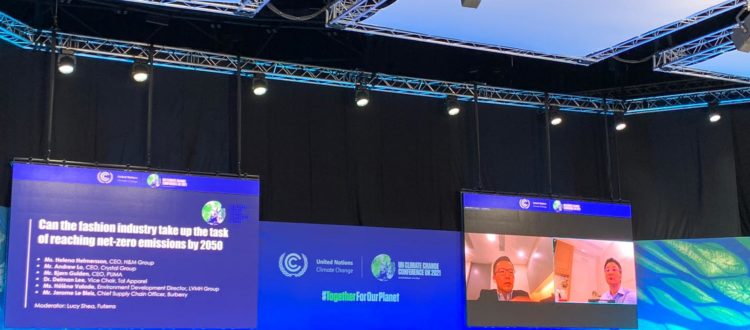COP26: THE FASHION INDUSTRY’S COMMITMENT TO ENVIRONMENTAL PROTECTION
Energy, transport and agriculture are the sectors most under the spotlight during every Climate Change Conference. But at COP26, which is heading towards its conclusion, the fashion industry finally made a bigger statement, announcing a major step forward in reducing its CO2 emissions.
A document, the Fashion Industry Charter for Climate Action, had been signed in 2018, with the goal of guiding the fashion industry toward bringing its net emissions to zero by 2050. The signatories, 30 companies and 41 organizations, here in Glasgow, have decided to renew the commitments they made and thus boost the level of climate ambition, in line with the goals of the Paris Agreement. Among other commitments, companies will act to:
- set evidence-based targets or halve their emissions by 2030;
- Use 100 percent electricity from renewable energy sources;
- Use sustainable raw materials;
- decarbonize their entire supply chain.
It is estimated that the fashion industry alone is responsible for between 2 and 8% of total global emissions, with huge negative impacts also in terms of water resources and use of land and raw materials. The so-called fast fashion – i.e. the mass production of many collections in a year at reduced prices – is the main contributor, but the whole textile and fashion industry is required to make a substantial shift to become more sustainable and contribute to climate action in a more incisive way.
“At a time when the climate crisis is accelerating to unprecedented levels, we need the real economy to drive climate action. The commitments renewed by the Fashion Charter signatories are an excellent example of such leadership,” said Niclas Svenningsen, Manager of UN Global Climate Action, during the side event organized to launch the new document.
Burberry, Puma, Tal Apparel, LVMH, Crystal Group have represented some of the companies involved in the Fashion Charter, in a debate that has seen as main themes the importance of cooperation among all the stakeholders involved, the lack of incentives to support innovation (especially for the raw materials used) and the need for stricter regulations to guide companies and disincentivize actions contrary to the protection of the environment and our planet.
There is still a long way to go, but without a concrete commitment that won’t remain only on paper, it will be difficult to really change course. The solutions are there, but they must be implemented and companies must act in synergy. As Stella McCartney, designer and founder of the homonymous fashion brand and special guest of the side event, also stated: “Innovation is a key element and it will be fundamental to spread excellent solutions in order to cut costs and allow the whole sector to improve”.

